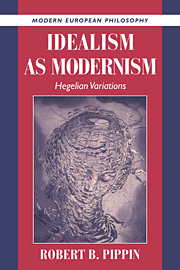Book contents
- Frontmatter
- Contents
- Acknowledgments
- Abbreviations
- Dedication
- 1 Introduction: Hegelianism?
- Part One The Original Options: Kant Versus Hegel
- Part Two Critical Modernism
- Part Three Greeks, Germans, and Moderns
- Part Four Narrating Modernity
- Part Five Modernism and Nihilism
- Part Six Heidegger's “Cuhnination”
- 15 On Being Anti-Cartesian: Hegel, Heidegger, Subjectivity, and Sociality
- 16 Heideggerean Historicity and Metaphysical Politics
- Part Seven Hegelianism
- Name Index
- Subject Index
15 - On Being Anti-Cartesian: Hegel, Heidegger, Subjectivity, and Sociality
Published online by Cambridge University Press: 05 June 2012
- Frontmatter
- Contents
- Acknowledgments
- Abbreviations
- Dedication
- 1 Introduction: Hegelianism?
- Part One The Original Options: Kant Versus Hegel
- Part Two Critical Modernism
- Part Three Greeks, Germans, and Moderns
- Part Four Narrating Modernity
- Part Five Modernism and Nihilism
- Part Six Heidegger's “Cuhnination”
- 15 On Being Anti-Cartesian: Hegel, Heidegger, Subjectivity, and Sociality
- 16 Heideggerean Historicity and Metaphysical Politics
- Part Seven Hegelianism
- Name Index
- Subject Index
Summary
I. Being-in-the-world and Not-Being-in-the-world
Contrary to Heidegger's own view, both Hegel and Heidegger are, I shall claim, anti-Cartesians. (According to Heidegger, Hegel was the greatest Cartesian.) I shall not be concerned here with the historical Descartes, the comments of either about Descartes, Heidegger's peculiar reading of Hegel, or anything like a full exposition of each position. Rather I am interested in the theoretical implications both draw from being anti- Cartesian, where that notion is understood in the following limited way.
Hegel and Heidegger understand Cartesian philosophy traditionally, as arguing that the possibility of any cognitive or even intelligible relation to the world resides in mental episodes occurring in individual minds. The world and entities within the world are, originally, significant or meaningful only as a result of the occurrence of such subjective states, or of some subject's intending, or linguistic, or representing, or synthesizing activities.
(Both, in other words, would regard naturalistic, neuroscientific, and psyichologistic accounts of such cognitive relations as still Cartesian, even if not wedded to the metaphysics of immaterialism. The key issue is whether representative success, or intelligibility in our dealings with the world, is something achieved by an individual subject's activity or processing, is a result. Although it might sound curious to put it this way, Mentalism, or some claim that significance is conferred by individual minds, is still mentalism, no matter what mens is said to be made of or how it works.)
- Type
- Chapter
- Information
- Idealism as ModernismHegelian Variations, pp. 375 - 394Publisher: Cambridge University PressPrint publication year: 1997
- 2
- Cited by



